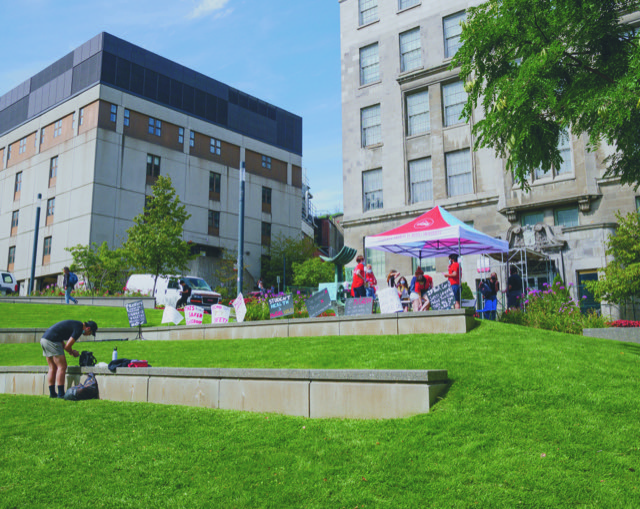Members of the Students’ Society of McGill University (SSMU) protested outside the James Administration building Sept. 1, calling for a safe and accessible return to campus. The common area outside was decorated with SSMU banners and posters that displayed slogans, with one asking whether McGill wanted its bicentennial to be remembered as one where students did not feel safe on campus. SSMU and McGill staff demanded that McGill implement a vaccine mandate, make accommodations for both international and immunocompromised students, and include student consultation in decisions concerning COVID-19.
SSMU vice-president (VP) of university affairs Claire Downie expressed her satisfaction with the demonstration, and argued that better accommodations for students is crucial.
“Everyone has different needs to feel safe on campus,” Downie said in an interview with The McGill Tribune. “Right now, McGill has not provided any accommodation for its international students who are stuck abroad, or immunocompromised students who cannot be safely on campus.”
According to Downie, SSMU’s efforts to address these concerns to the administration at the end of last spring were unsuccessful.
“We have been trying to communicate with the university for several months on this issue,” Downie said. “We spoke in June or May with Fabrice Lebeau and Chris Buddle and we were just told to look at the positive, ‘the vaccine rollout is going so well, everything is going to be normal and fine. ’ But in reality that is not the case.”
Emily Black, U4 Arts and a participant at the protest, expressed concern about being back on campus as an immunocompromised person.
“McGill has suggested that students in such extraordinary situations should take a year off,” Black said. “If I were to do that, because I am on student aid, I would lose all my funding and would probably not be able to come back [to McGill].”
McGill’s response to student and faculty concerns has been to remind everyone of health and safety measures, including procedural mask requirements, distancing in non-classroom environments, contact tracing, and optimizing ventilation.
Downie explained that every Canadian university that has implemented a vaccine mandate has given students a buffer time of six weeks to get vaccinated or apply for a human rights exemption.
“A vaccine mandate never means that everyone has to be vaccinated or that you will be kicked off if you are not,” Downie said. “You might have to be tested three times a week in order to be on campus, whereas a vaccinated student will be exempt from that.”
McGill Faculty of Law professor Richard Gold argued that the university’s decision to not impose a vaccine mandate is discriminatory against vulnerable members of the community.
“Our view is that McGill is in breach of its obligations under article 10 of the Quebec Charter of Human Rights and Freedoms by having adopted a policy that discriminates against disabled and pregnant [people], and those who live in families where individuals are at risk,” Gold said.
On Aug. 29, the Office of the Provost and vice-president (Academic) sent an internal memo to faculty deans, which a CBC reporter shared to Twitter, that stated that fear of campus safety and concern about relatives who might be at risk to possible exposure to COVID-19, were not valid reasons for an instructor to teach remotely.
Gold argued McGill could, and should, implement a vaccine mandate as well as stricter requirements.
“We have asked McGill for months to explain the legal basis of its claim otherwise and it has refused to answer,” Gold said. “Provost Jutras at the University of Montreal concluded that the university could bring in a requirement if it decided to do so. McGill is in no different situation. In short, there is little doubt that McGill could, but refuses to, implement a proof of vaccination requirement.”
The McGill Tribune reached out to the McGill administration for a comment on the demands for a vaccine mandate and did not receive a response.







